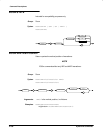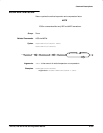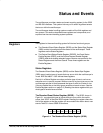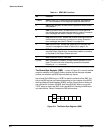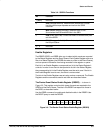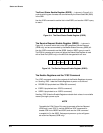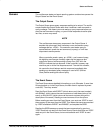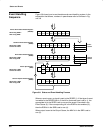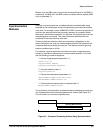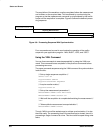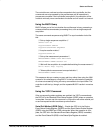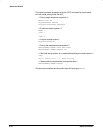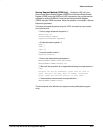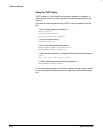
Status and Events
TDS 310, TDS 320 & TDS 350 Programmer Manual
3Ć5
The oscilloscope status and event reporting system contains two queues: the
Output Queue and the Event Queue.
The Output Queue
The Output Queue stores query responses waiting to be output. The oscilloĆ
scope empties the Output Queue each time it receives a new command or
query message. This means you must read any query response before you
send the next command or query, or you will lose responses to earlier querĆ
ies. Also, an error may result.
NOTE
The oscilloscope stores query responses in the Output Queue. It
empties this queue each time it receives a new command or query
message after an <EOM>. The controller must read a query reĆ
sponse before it sends the next command (or query) or it will lose
responses to earlier queries.
When a controller sends a query, an <EOM>, and a second query,
the digitizing oscilloscope normally clears the first response and
outputs the second while reporting a Query Error (QYE bit in the
ESER) to indicate the lost response. A fast controller, however, may
receive a part or all the first response as well. To avoid this situation,
the controller should always read the response immediately after
sending any terminated query message or send a DCL (Device
Clear) before sending the second query.
The Event Queue
The Event Queue stores detailed information on up to 20 events. If more than
20 events stack up in the Event Queue, the 20th event is replaced by event
code 350, Too many events."
Read the Event Queue with EVENT? (which returns only the event number),
with EVMsg? (which returns the event number and a text description of the
event), or with ALLEV? (which returns all the event numbers along with a
description of the event). Reading an event removes it from the queue.
Before reading an event from the Event Queue, you must use *ESR? to read
the summary of the event from the SESR. This makes the events summarized
by *ESR? available to EVENT? and EVMSG?, and empties the SESR.
Reading the SESR erases any events that were summarized by previous
*ESR? reads but not read from the Event Queue. Events that follow an *ESR?
read are put in the Event Queue, but are not available until *ESR? is used
again.
Queues



